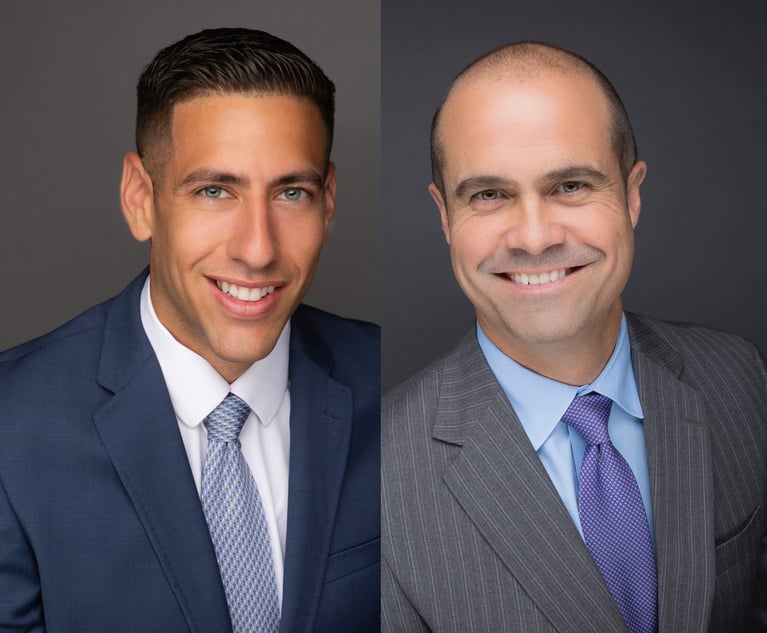Dentons' Expansion in Florida Is Part of New US Strategy
Dentons' deal with Cohen & Grigsby adds 19 attorneys in Naples as part of an ambitious U.S. expansion plan.
October 07, 2019 at 09:15 PM
7 minute read
The original version of this story was published on The American Lawyer
 Dentons. Photo: Diego M. Radzinschi
Dentons. Photo: Diego M. Radzinschi
Dentons is supercharging its ambitions in the United States by announcing combinations with two major regional players that give the law firm a full-fledged presence in Florida for the first time.
The addition of over 300 attorneys with the Pittsburgh-based Cohen & Grigsby and the Midwest's Bingham Greenebaum Doll is part of a Dentons campaign to build what it calls the first "national" U.S. law firm.
Cohen & Grigsby's website lists 19 attorneys in Naples, including chairman emeritus Charles Cohen. In contrast, Dentons lists two attorneys in Miami, but one is a Washington partner. The other is counsel Monica Irel with an office address in suburban West Kendall.
Already the largest firm in the world, Dentons envisions about 1,100 attorney in the U.S. by January, more than all but 10 other firms. The campaign is called Operation Golden Spike, named for the ceremonial 17.6-karat gold spike that tied together the Transcontinental Railroad in 1869.
Dentons' leaders note none of the 10 largest full-service firms in the country boasts a presence in all 20 of the largest U.S. markets — and they see an appetite for that kind of scale.
"Clients are seeking seamless service and one-stop shopping," said Dentons global CEO Elliott Portnoy. "They simply can't get that today in all of the markets that matter to their business in the U.S."
After growing dramatically across the globe since the firm was created in a 2013 three-way merger, Dentons has been open about its aspirations for the U.S. market. The tie-ups with Bingham Greenebaum and Cohen & Grigsby mark the first step.
Prior to the combination, Dentons had offices in 23 U.S. cities, part of an overall 181 offices in 73 countries. The 176-lawyer Bingham Greenebaum has offices in Indianapolis, Cincinnati and Louisville and Lexington, Kentucky, and two smaller Indiana cities. The 140-plus attorney Cohen & Grigsby's offices are in Pittsburgh, Harrisburg, Pennsylvania, and Naples.
There's plenty more room to grow, the firm's top management maintains.
"When you do that research, you see how law firms in the U.S. are comparably much smaller than law firms in virtually any other market in the world," said Dentons global chair Joe Andrew.
If Dentons were as large in America as the firm is in its U.K and the Middle East region, relative to the size of the legal market, it would have 2,274 U.S. lawyers. It would have 6,082 U.S. lawyers compared to Canada and 9,065 lawyers compared to China.
Andrew made the case that clients, who are increasingly working with a smaller number of firms, are clamoring for greater scale.
"If a client has to go to 10 law firms instead of one, you need to have significantly more people in house to manage that," he said.
That's part of why Zeughauser Group consultant Kent Zimmerman said he was "surprised" that no one has tried this sooner.
"The industry is consolidating rapidly and the drivers of that consolidation are becoming clearer," he said. "Law firms realize that with scale comes a higher profile, better known brand and reputation, more at bats for sought-after clients' matters, more resources to use to serve clients with evolving technology and to train lawyers as they come up through the ranks, and more resources also to attract and retain sought after lawyers."
A Dual Partnership
The challenge is to land on a structure for expansion that works.
The firm said two other firms are talking with Dentons this week and four more before Thanksgiving. Under a dual partnership model, new lawyers remain with their existing firms while becoming partners of the new Dentons U.S. firm.
This is intended to avoid the fundamental problems with the two primary strategies law firms use to grow. Expanding via laterals is time-consuming and risky, and it can't capture the reputation that firms have established in their respective markets. Mergers are just as tricky to pull off, and when successful, they can sand away the cultural attributes that gave the firm a leg up.
Through 15 months of discussion with the leaders of Bingham Greenebaum and Cohen & Grigsby, the firm's leadership hit on a model that seeks to replicate the incentive structure of a traditional partnership, where all lawyers gain through sharing work with their colleagues.
"How do we replicate that system?" Andrew asked. "Everyone is the member of one partnership when people are also part of different economic entities."
The economics are based on the premise that half of a firm's profit margin derives from originating the work. When different firms under the Dentons U.S. umbrella share work, in a process that will be guided by the leaders of the firm's national practice groups, the firm that brought in the client will earn half the profit, while the firm handling the matter will earn the other half.
"On average, that's how all partnerships work," Andrew said. "By being overt about it, we're putting everyone in the position of trying to increase the margin."
That not only means growing the client relationship but also striving to reduce costs. And firms like Cohen & Grigsby and Bingham Greenebaum will realize savings on technology, insurance and administrative costs.
Bingham Greenebaum managing partner Toby McClamroch said the firm's analysis showed that for every dollar it moves to the national platform, it will ultimately save $1.20.
"With technology and process and data, there really are economies of scale," said professor William Henderson at Indiana University Maurer School of Law.
But achieving savings isn't the only selling point for regional firms that may have resisted joining a larger enterprise.
"The model gives you the opportunity to continue to serve growing client needs while maintaining the legacy that you have today," said Cohen & Grigsby president and CEO Chris Carson.
His firm and others retain control over elements that have been traditionally part of their domain, like governance, compensation structure, leadership.
"The beauty of this proposal is that clients don't care about these things," McClamroch said.
What clients care about is maintaining relationships with trusted counsel, and this makes it more possible even as businesses expand beyond their home territory.
"This is an opportunity for a lawyer to stay part of that journey and be the quarterback navigating the global landscape. That's the potential upside," Henderson said. "You can stay with your client as they continue to grow."
The firms that join will retain their legacy names, at least for now. Cohen & Grigsby will rebrand as Dentons Cohen & Grigsby, while Bingham Greenebaum will become Dentons Bingham Greenebaum.
And if Dentons' rapid growth overseas offers any lesson, expect to see that name in front of more firms from all across the U.S.
"One of the really interesting things we've experienced together in the last 15 months is we learned that there are a very similar firms with a lot of talent all over the country that could really benefit from this kind of model," Carson said.
Read More
Midwest Merger Makes Taft an Am Law 100 Contender
Are Law Firm Mergers Hot or Not? It Depends Who's Counting
The Global 100 Are in the Midst of a Growth Spurt
This content has been archived. It is available through our partners, LexisNexis® and Bloomberg Law.
To view this content, please continue to their sites.
Not a Lexis Subscriber?
Subscribe Now
Not a Bloomberg Law Subscriber?
Subscribe Now
NOT FOR REPRINT
© 2025 ALM Global, LLC, All Rights Reserved. Request academic re-use from www.copyright.com. All other uses, submit a request to [email protected]. For more information visit Asset & Logo Licensing.
You Might Like
View All

Local Boutique Expands Significantly, Hiring Litigator Who Won $63M Verdict Against City of Miami Commissioner
3 minute read
Greenberg Traurig Combines Digital Infrastructure and Real Estate Groups, Anticipating Uptick in Demand
4 minute read
As Unpredictability Rises, Gov't Law Practices Expect Trump Bump. Especially in Florida
5 minute readTrending Stories
Who Got The Work
J. Brugh Lower of Gibbons has entered an appearance for industrial equipment supplier Devco Corporation in a pending trademark infringement lawsuit. The suit, accusing the defendant of selling knock-off Graco products, was filed Dec. 18 in New Jersey District Court by Rivkin Radler on behalf of Graco Inc. and Graco Minnesota. The case, assigned to U.S. District Judge Zahid N. Quraishi, is 3:24-cv-11294, Graco Inc. et al v. Devco Corporation.
Who Got The Work
Rebecca Maller-Stein and Kent A. Yalowitz of Arnold & Porter Kaye Scholer have entered their appearances for Hanaco Venture Capital and its executives, Lior Prosor and David Frankel, in a pending securities lawsuit. The action, filed on Dec. 24 in New York Southern District Court by Zell, Aron & Co. on behalf of Goldeneye Advisors, accuses the defendants of negligently and fraudulently managing the plaintiff's $1 million investment. The case, assigned to U.S. District Judge Vernon S. Broderick, is 1:24-cv-09918, Goldeneye Advisors, LLC v. Hanaco Venture Capital, Ltd. et al.
Who Got The Work
Attorneys from A&O Shearman has stepped in as defense counsel for Toronto-Dominion Bank and other defendants in a pending securities class action. The suit, filed Dec. 11 in New York Southern District Court by Bleichmar Fonti & Auld, accuses the defendants of concealing the bank's 'pervasive' deficiencies in regards to its compliance with the Bank Secrecy Act and the quality of its anti-money laundering controls. The case, assigned to U.S. District Judge Arun Subramanian, is 1:24-cv-09445, Gonzalez v. The Toronto-Dominion Bank et al.
Who Got The Work
Crown Castle International, a Pennsylvania company providing shared communications infrastructure, has turned to Luke D. Wolf of Gordon Rees Scully Mansukhani to fend off a pending breach-of-contract lawsuit. The court action, filed Nov. 25 in Michigan Eastern District Court by Hooper Hathaway PC on behalf of The Town Residences LLC, accuses Crown Castle of failing to transfer approximately $30,000 in utility payments from T-Mobile in breach of a roof-top lease and assignment agreement. The case, assigned to U.S. District Judge Susan K. Declercq, is 2:24-cv-13131, The Town Residences LLC v. T-Mobile US, Inc. et al.
Who Got The Work
Wilfred P. Coronato and Daniel M. Schwartz of McCarter & English have stepped in as defense counsel to Electrolux Home Products Inc. in a pending product liability lawsuit. The court action, filed Nov. 26 in New York Eastern District Court by Poulos Lopiccolo PC and Nagel Rice LLP on behalf of David Stern, alleges that the defendant's refrigerators’ drawers and shelving repeatedly break and fall apart within months after purchase. The case, assigned to U.S. District Judge Joan M. Azrack, is 2:24-cv-08204, Stern v. Electrolux Home Products, Inc.
Featured Firms
Law Offices of Gary Martin Hays & Associates, P.C.
(470) 294-1674
Law Offices of Mark E. Salomone
(857) 444-6468
Smith & Hassler
(713) 739-1250






